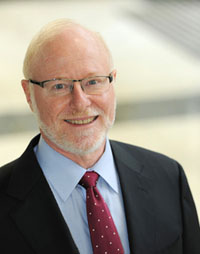As Dalhousie works towards the end of its budget process — read more at "Your feedback: Budget committee responds to student consultations — President Tom Traves is balancing his focus between Dal’s internal budgeting and external financial discussions. He’s been meeting regularly with representations from the Department of Labour and Advanced Education with the goal of producing an improved funding model for universities.
There has not been a multi-year Memorandum of Understanding, or MOU, between Nova Scotia’s universities and the province since 2011.
 “The idea behind having an MOU was to provide stable and predictable funding so universities could plan across several years,” says Dr. Traves. “Since the second MOU expired, though, the operating grant has been set on an arbitrary basis each year, with no real recognition, we feel, of the cost drivers in post-secondary education.”
“The idea behind having an MOU was to provide stable and predictable funding so universities could plan across several years,” says Dr. Traves. “Since the second MOU expired, though, the operating grant has been set on an arbitrary basis each year, with no real recognition, we feel, of the cost drivers in post-secondary education.”
Funding has been cut to universities by 4%, 3% and 3% over the past three years respectively. Dr. Traves believes reversing that trend is long overdue, but he says that’s only half of the funding story. The other is that the province’s allocation of funding has failed to take into account Dal’s enrolment growth. Even setting aside the addition of the Faculty of Agriculture, Dal’s student population has grown by 20% since 2002 — more than 2,600 students.
Dr. Traves explains that in the 2004-07 MOU, the allotment of funding each university received from the province was based on enrolment numbers from the mid-90s. Then, in the 2008-11 MOU, it was based on an enrolment average of the years 2004 to 2006, phased in over three years, with an understanding that the years considered in that range would roll forward each year.
“That didn’t happen,” says Dr. Traves. “That alone has cost Dal $45 million. Or, if you want to look at it a different way, you could say there are around 2,000 students on campus that we receive no provincial funding for.”
Dr. Traves says working to achieve a fairer funding formula is his top priority in his final three months in office.
“Dalhousie is economic engine for the province. We produce stellar graduates, conduct important research and make critical contributions to our community. Does our current funding arrangement reflect that impact? At the moment I’d have to say no. But my hope is that in working with the province, we’ll come to a place where I can confidently answer ‘yes.’”
Read also: Your feedback: Budget committee responds to student consultations

